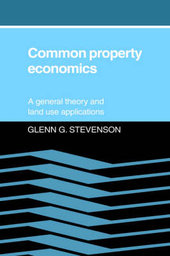
|
Common Property Economics: A General Theory and Land Use Applications
Hardback
Main Details
| Title |
Common Property Economics: A General Theory and Land Use Applications
|
| Authors and Contributors |
By (author) Glenn G. Stevenson
|
| Physical Properties |
| Format:Hardback | | Pages:272 | | Dimensions(mm): Height 236,Width 160 |
|
| Category/Genre | Management of land and natural resources |
|---|
| ISBN/Barcode |
9780521384414
|
| Classifications | Dewey:333.2 |
|---|
| Audience | | Professional & Vocational | |
|---|
|
Publishing Details |
| Publisher |
Cambridge University Press
|
| Imprint |
Cambridge University Press
|
| Publication Date |
30 August 1991 |
| Publication Country |
United Kingdom
|
Description
Common Property Economics defines and clarifies the theoretical distinction between open access and common property and empirically tests the adequacy of resource allocation under common property in comparison with private property. The book presents theoretical models to demonstrate overexploitation under open access. Seven necessary and sufficient conditions differentiate common property from open access. Swiss alpine grazing commons are contrasted with grazing in the English open field system. Statistical work using Swiss data compares the performance of common property with private property. Whether it be fisheries, grazing land, oil and gas pools, groundwater, or wildlife, group use of natural resources has long received the blame for overexploitation and mismanagement. In this book two types of group use are identified: open access and common property. Open access refers to resource utilization without any controls on extraction rates, a situation in which resource overexploitation often occurs. On the other hand, "common property" is a term that ought to be reserved for group use in which outside access and user extraction rates are controlled.
Reviews"...a fine addition to the property rights literature. It is well written, and it provides a clear distinction between the concepts of open access and common property." Journal of Comparative Economics
|